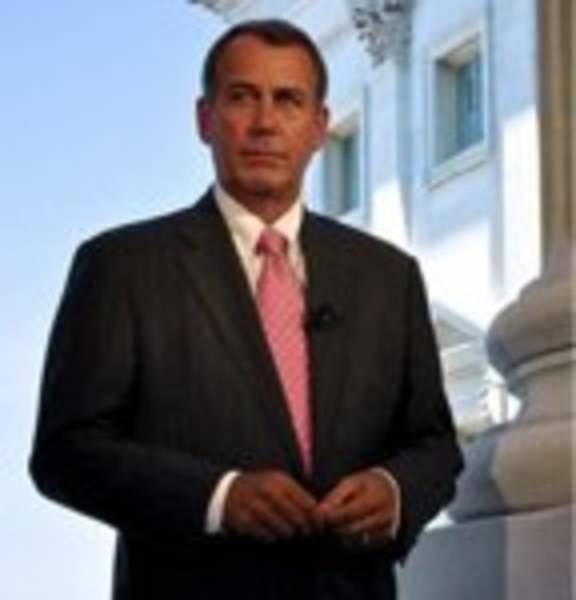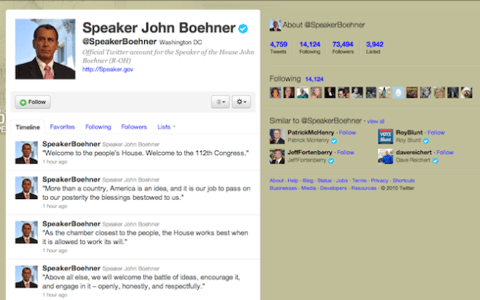Today is the first day of the 112th Congress of the United States of America. One way that the incoming Republican majority will embrace innovation and transparency in the legislative process will be increased use of video and new media. As Marshall Kirkpatrick wrote at ReadWriteWeb, commenting on CNN’s report yesterday, Facebook will livestream the opening day of Congress.

In a post on Speaker.gov, the incoming speaker invited people to visit the “Pledge to America” Facebook page to view the transition to a GOP-controlled House and comment on the feed. (The post was originally at GOPLeader.gov before Speaker.gov went live, which created a broken link from the speaker’s tweet. Even e-transitions are bumpy at times.)
When reached for further comment, Nick Schaper, the director of new media for the incoming Speaker of the House, explained more about why they’re livestreaming the transition and using Facebook.
“Keeping with one of the pillars of House Republicans’ Pledge to America, our goal is to make Congress more open and available to the American public,” said Schaper in an email. “With over 500 million active users, Facebook is an easy way to effectively reach a large audience for the stream, while also making those that might not know much about the Pledge more aware of the new majority’s goals and priorities. Also, Facebook gives viewers the unique ability to discuss this historic event with their friends and others.”
Schaper explained that the Speaker’s staff is using the LiveStream.com plugin available on Facebook with the standard House of Representatives floor feed available on Capitol Hill to put the feed online. Notably, that also means that citizens and other interested parties don’t have to join Facebook, log in or “Like” the page to watch the transition. The feed at Livestream.com/SpeakerBoehner
is available on the open Web and can be embedded on any blog or
article – including this one.
Watch
from
at livestream.com
Livestream.com and Facebook won’t be the only options used by the new speaker’s office either, according to Schaper. When asked whether the speaker would use Current.tv or UStream or YouTube, Schaper said that “we’ve never limited ourselves or worked exclusively with any technology partners on efforts such as this. We’ve used all of the above and I look forward to finding more new tools that can help our members more efficiently connect with those they represent.”
Moving closer to House 2.0
The embrace of new technology won’t be limited to streaming live from within Facebook. Proposals will range from allowing iPads and smartphones onto the House floor to crowdsourcing budgeting proposals to posting bills online 72 hours before a vote. On this historic moment, the House of Representatives has proposed new rules that will bring one half of the legislative branch closer to the increased government transparency that organizations like the Sunlight Foundation have advocated for years.
The transition also included a virtual passing of the gavel from Representative Nancy Pelosi to Boehner on Twitter, as Twitter’s own government liaison, Adam Sharp, noted on Twitter. Speaker.gov was updated to a new version last night, including a blog post that announced the new @SpeakerBoehner account and those of his staff. The post also introduced new accounts on Facebook, YouTube and Flickr, along with the Livestream.com account embedded above.
The YouTube and Flickr accounts were empty last night but Don Seymour wrote at Speaker.gov that “video of Ellie Mae – the job-sniffing GOP bloodhound –Boehner’s family reunion, responses to questions from constituents, or one of the Speaker’s speeches or interviews” will be uploaded there in the future.

In other words, the Speaker of the House of Representatives is now represented on more online platforms than ever. The White House still leads the federal government as a whole in covering the gamut, with presences on MySpace, Vimeo, iTunes, LinkedIn and even Digg now. (No word on how soon before the President, Speaker or other public officials will be available for question time on Quora.)
As 2011 begins, new media adoption in Washington is no longer novel. As with any set of tools, success shouldn’t be measured by media reports or press releases but by the outcomes from their use. The hard work of bipartisan compromise in the House, to the extent it occurs, is unlikely to be publicly visible in 140 characters, though stranger things have happened. Measuring the success of adoption new technology will depend far more upon whether more use of social media, online video and platforms for legislation or citizen engagement lead to greater citizen engagement, accountability, transparency or data-driven policy. Whether that comes to pass will rely on more than putting a transition live online.

















